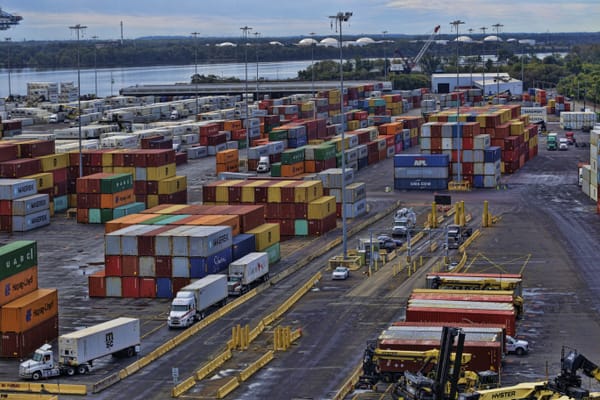Immigration dominated the 2024 election, with voters rejecting the chaos and strain caused by uncontrolled border crossings. Now, President-elect Donald Trump has tapped South Dakota Gov. Kristi Noem as his pick for secretary of homeland security, part of his incoming administration’s promise to prioritize border security. But fixing America’s borders isn’t just about controlling the lawful inflow of people. There’s also the influx of dangerous and unregulated goods through America’s ports of entry.
In response, Noem needs to dramatically reform US Customs and Border Protection, an agency that operates under the Department of Homeland Security. For too long, CBP has allowed import lawlessness to flourish. Particularly egregious is the influx of dangerous goods and drugs through a legal loophole known as “de minimis.”
Each day, an astonishing 4 million packages enter the homeland through the de minimis provision of US customs law. Almost all of them—including an estimated 60 percent that originate in China—face no inspection, duties, or regulations. This is no accident. It’s an open-borders policy for packages, aggressively supported by the lobbying of companies that include Shein, TEMU, Amazon, FedEx, and UPS.
De minimis was originally a minor part of US customs law. It allowed Americans to avoid paying duties on inconsequential trinkets and souvenirs from overseas trips. But when NAFTA was ratified in 1994, then-President Bill Clinton’s CBP implemented new regulations for de minimis entry that effectively allowed transnational criminal organizations and thousands of unidentifiable foreign vendors to import merchandise into the United States. This ran contrary to longstanding US law requiring registered importers and their licensed brokers to be accountable and knowledgeable regarding the merchandise they import.
CBP’s rule change meant that America’s mail carriers and express couriers would now serve as de facto importers—even if they had no knowledge of the merchandise they were delivering. This posed serious problems, and the National Customs Brokers and Forwarders Association of America warned that the policy change would make it harder to enforce visa requirements, intellectual-property rules, and Food and Drug Administration regulations.
Then, in 2016, Congress acquiesced to the lobbying of Amazon and other express shippers and widened the de minimis loophole, vastly expanding the flood of goods allowed to enter the United States without facing any taxes, fees, or inspections whatsoever.
Since then, e-commerce sales have exploded. Each day, millions of small, unvetted packages flow directly to US consumers. Essentially, de minimis has become an unregulated backdoor through US ports; as long as a package has a declared value of less than $800, it’s simply waved through. Worse still, large quantities of high-potency fentanyl arrive in such shipments.
Most de minimis packages contain no identifying data beyond a mailing label, a declared value, and a brief description of contents. Customs personnel can’t feasibly examine all of these labels. And even a cursory review will miss packages hiding fentanyl and other contraband.
In June 2023, CBP admitted that the “overwhelming volume of small packages and lack of actionable data” make it virtually impossible to “identify and interdict high-risk shipments that may contain narcotics.” The National Bureau of Economic Research has reported that “a substantial amount of fentanyl smuggling” occurs through de minimis.
Despite this, CBP allowed more than 685 million uninspected de minimis shipments in 2022—and more than 1 billion last year. Essentially, the de minimis loophole has become a profit windfall for express shippers and e-commerce platforms. Beijing has benefited, too, since the de minimis loophole added an estimated $188 billion to America’s trade deficit with China in 2022 alone.
De minimis has helped China in other ways. When shipments contain little or no identifying info, it’s impossible to know if they contain fentanyl, toxic toys, or goods produced by forced labor. Even in the best case, foreign sellers don’t follow the stringent laws that America’s producers must abide by every day. And so, Middle America—which once thrived with manufacturing jobs—has become a wasteland of economic despair as domestic factories have shut down.
“The American people don’t know what’s being brought into the country.”
One of the biggest obstacles to customs reform is the Commercial Customs Operations Advisory Committee, or COAC, that operates inside CBP and secretly advises its staff. COAC’s members are express shippers and e-retailers consistently pushing CBP to open America’s borders wider to even more unregulated goods. These companies and their lawyers now have the inside track to prevent CBP from conducting its inspection, trade enforcement, and tariff collection responsibilities.
It is past time to close the de minimis loophole. CBP must also work to boost transparency on the entry data it collects. Far too many manifests, bills of lading, and other shipment information are being obscured. As a result, the American people don’t know what’s being brought into the country.
When Noem assumes her role as secretary of homeland Security, she must act swiftly to end the anarchy at our ports. Ending de minimis, and holding importers accountable, will mark an important step toward restoring consumer safety, protecting American workers, and rebuilding American industry.
